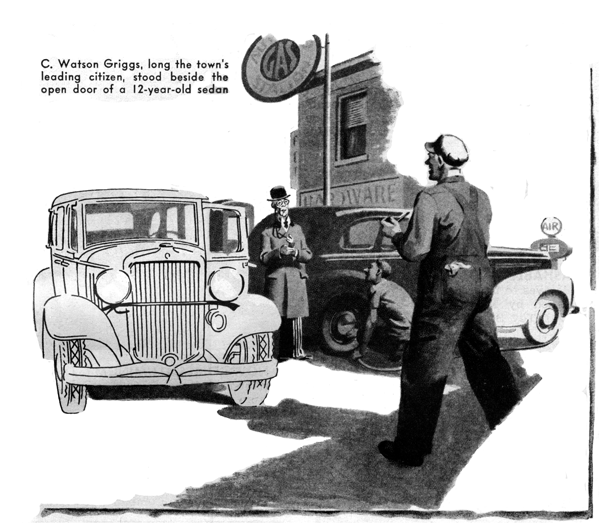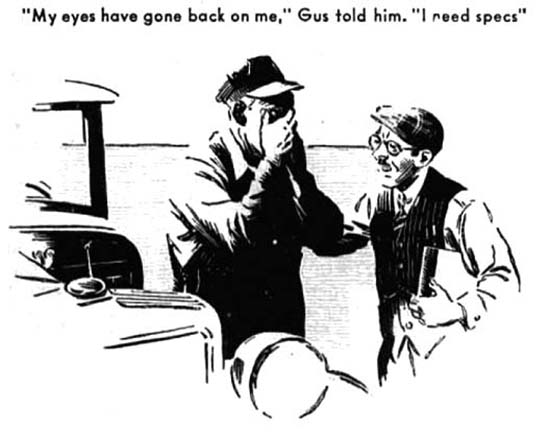April 1945
GUS
WILSON GETS A SCARE
by Martin Bunn

"That old guy's here again," announced Stan Hicks, the Model Garage grease monkey. "I sold him two A coupons' worth of gas and a quart of oil, and he says he wants to talk to you."
"What old guy?" Gus demanded.
"I dunno his name," Stan said. "What I mean is -- I know it, but I can't remember it. Riggs, no, it ain't Riggs. Briggs? No, that ain't it either. Let's see now -- it ain't -- "
"It ain't Gunzenhoffer, and it ain't Murphy," Gus mocked. "For the love of Mike, kid, stop telling me what the man's name ain't. I asked you what it is!"
"Well, I'm trying to remember it, ain't I?" Stan answered in an injured voice. "It's the old geezer who brought his car in here last summer to have the brakes fixed after he'd pretty near bumped a truck in the bustle. Let's see, now. His name -- "
"Let it slide," Gus told him. "His name is Griggs. I'll go see what he wants right now."
C. Watson Griggs, long our community's leading citizen, was standing stiffly prim and proper beside the open door of his 12-year-old sedan. Except that he had substituted a square-crowned derby for his stiff straw and that he wore a velvet collared topcoat over his decorous formal suit, he looked exactly as he looked when Gus saw him last during the summer. But the well-kept spruceness that had been George Hamby's reward for ceaseless watchfulness and effort was noticeably absent now that Hamby was in the Army and Mr. Griggs, as he lost no opportunity to say, was doing his bit by driving himself.
Seeing Gus approach, he gave him a stately but friendly greeting.
"Morning, Mr. Griggs," Gus responded cheerily. "Haven't seen you for a long time.
What do you hear from Hamby -- and how's the car running?"
"Hamby," Mr. Griggs said, "has given me cause for pride. He has his foot on the first rung of the ladder of military advancement. He wrote me that he had been promoted to the rank of corporal.
"As for my car, although I have observed all the instructions given me by Hamby when he answered the call to the colors. Its performance has become far from satisfactory. When I allow the motor to run for a short time with the clutch, disengaged -- idling, I believe, is the proper technical term -- it usually stops, causing me severe embarrassment in traffic. When I drive at low speed the action is jerky and the vibration unpleasant. On the few occasions when I have exceeded momentarily the wartime speed limit of 35 miles an hour, the motor has -- er -- sputtered in a most disconcerting manner. These manifestations have become increasingly evident of late. To what, Mr. Wilson, do you attribute this -- er -- progressive deterioration?"
It took a desperate effort, but Gus kept his face straight. His eyes rested on the old car's speedometer, and he saw that 61,307 miles were checked on it.
"Well," he said diplomatically, "your car isn't new, you know. But it always has had good care, and the chances are that the trouble is the result of some minor misadjustment. I'll have to do some checking before I can tell you what it is."
Mr. Griggs consulted a thick gold watch. "The reason for my being in town today," he said, "is the monthly meeting of the directors of the First National. I must be at the bank at 10 o'clock. I propose, Mr. Wilson, to leave my car with you in the hope that you will be able to remedy the trouble and have the car delivered to me at the bank by three o'clock this afternoon."
"I'll do my best," Gus promised. He watched Mr. Griggs make his dignified way across the street to the bus stop. Then Gus climbed into the driver's seat and started the engine. It idled unevenly and bucked a couple of times as he drove into the shop.
"It might be the carburetor," he told himself, "but more likely it's the ignition. Should be easy to find."
He got out and raised the hood. Once back in the summer he had overhauled the engine. Now it wasn't in quite the apple-pie condition in which Hamby always had kept it, but it wasn't dirty. Mr. Griggs obviously had been doing his inexpert best to keep the car up.
Gus started his checking by doing what he always does first in these days of subnormal gasoline when he is dealing with a missing engine -- he examined the spark plugs. He was agreeably surprised to find that they weren't fouled or even badly sooted, and evidence that they had been cleaned recently raised his estimation of Mr. Griggs' mechanical endeavors although he had to grin at the thought of the leading citizen with his stiff-cuffed shirt sleeves rolled up and his hands black with carbon. Closer inspection showed that the points were neither burned nor corroded and that none of the plugs had cracks in the porcelain.
Then Gus checked the wiring. There were no excessive voltage drops -- which barred a broken wire or loose connection as the cause of the missing. He tested the coil and condenser, and found both in good condition.
"Must be the carburetor after all," he thought. After making certain that there was no obstruction in the fuel line, he checked the carburetor. It was moderately clean, the float worked properly, the jets weren't clogged and the intake gasket was tight.
Gus realized that Mr. Griggs had slipped him a brain twister, and he decided a road test was needed to throw light on a murky automotive problem. But two miles up the highway and back added nothing to the information that Griggs had given him -- that the engine was rough in idling and missed occasionally at high speeds.
Back in the shop, Gus went over the wiring again. Then he scratched his head, lighted his pipe, and did some hard thinking. After a moment he lifted off the distributor cap and measured the point setting with a feeler gauge. He found the points set at .020." Consulting the record he keeps of every engine on which he does an overhaul job, he found the correct point setting for the engine was .018."
"You're slipping, old boy!" he told himself. "If Stan hadn't thought of the point setting on a job like this you'd have called him a dumbbell, and then you go and forget to check it yourself!"
He set the points at .018," and drove out for another road test.
The engine was rough and still had a high-speed miss.
Gus was talking to himself as he drove back to the shop. When he got there he checked the points again.
The setting was .010!"
He squinted at the gauge, and shook his head in bewilderment. "First time I ever pulled that boner!" he told himself. "I must be getting careless." He set the points for .0l8" very carefully, and rechecked them to make certain he had made no mistake. "That'll do it," he thought, and drove out to prove it.
The engine performed just as badly as it had on the previous tests.
Back in the shop, Gus did some more hard thinking. It got him nowhere, as he rechecked the points once more. They were set for .026"!
Five minutes later Joe Clark came into the shop and found his usually cheerful partner with a hand over his eyes. "Hey!" he said. "What's the matter with you?"
"My eyes have gone bad on me," Gus told him somberly. "I'll have to go downtown and get 'em examined. Have to wear specs, I guess."
"So what?" Joe grunted unsympathetically. "I've had to wear 'em all my life."
"That's different," Gus said with equal lack of sympathy. "I've always had eyes like a hawk's. Why the devil should they go back on me now? It's a tough break!"
"Just old age," Joe told him, grinning widely. "How do you know there's anything the matter with your eyes? Do they hurt you?"
"No, they don't hurt," Gus said. "But I know they're shot. Why, I've just set the points in this distributor incorrectly -- twice! That's proof enough . . . Hey, Stan!" The grease monkey came over to him. "Check these points for me, will you?"
The car was in gear -- Gus had been pushing it back and forth to turn the engine so the points would open on the high point of the cam. When Gus handed him the feeler gauge, Stan leaned against the fender as he examined it. His weight made the car roll a bit, and Gus had to push it to open the points again.
Stan checked them carefully. "They're set for .010" "he reported.
"What!" Gus roared. "you're crazy -- or I am!" Suddenly a wide grin split his face. "I'm the one who's crazy," he said. "Let's have that gauge!"
He checked the points and got the same .010" reading that Stan had. Then he pushed the car until the points opened on another cam lobe and checked again. This time the reading was .018".
Gus began to laugh. "What are you so darned happy about all of a sudden?" Joe demanded. "Half a minute ago you were glooming because your eyes were shot, and now you're as happy as if your rich uncle had put you in his will."
Eyes?" Gus chuckled. "You needn't worry about my eyes. They're as good as they ever were and that's plenty good! It's the old bean that has slowed down, Joe. You'd better watch out or it'll happen to you, too. I've noticed symptoms!"
Joe told him he was nuts, and went back into the front office.
"Hey, boss, what's this all about?" Stan asked. "How can points be set at .010" and set at .018" at the same time? I don't get it."
"I didn't get it, either not for quite a while," Gus said. "And not getting it gave me the scare of my life. Can you imagine me going around wearing specs?"
Stan grinned at the idea. "But how about those screwy point settings boss?" he insisted. "What's the answer?"
"The answer to a worn cam that allows a setting of .018" on one cam lobe while on another it is .010." When I set the points open on the worn lobe to .018" -- which is correct for this particular engine -- the less worn lobe opened the points to .026".
Naturally, that made the engine buck when it idled, and made it miss at high speeds. We'll install a new cam, and C. Watson Griggs won't have any more trouble -- until next time."
"Yeah -- I get it now." Stan said. But what made the cam wear out of true like that?"
"Use," Gus told him. "This old bus has over 60,000 miles on its clock." He did some figuring on the back of an envelope. "That means that the points have opened and closed something like 20 million times. When you have that much wear, any tiny imperfection in the metal or its hardening can build up to trouble. Another cam, made in the same way, at the same time might have lasted three times as long. This one didn't. Nothing lasts forever."
"That's right, boss -- not even eyes!" Stan said -- and ducked the oily rag that Gus tossed at him.
END
L. Osbone 2019
